- About Ramapo
- Academics
- Admissions & Aid
- Student Life
- Athletics
- Alumni
- Arts & Community
- Quick Links
- Apply
- Visit
- Give
CHGS Events
CHGS Events, Spring 2025
Explore our Holocaust and Genocide Educator Programs
All times given in Eastern Standard Time
All events are free and open to the public.
For more information write to holgen@ramapo.edu.
“The Last Years of Lived Holocaust Memory”
An International Holocaust Remembrance Day Commemorative Lecture
Dr. Jacob Ari Labendz, CHGS Director
Tuesday, January 21 at 7:00 pm / Virtual only
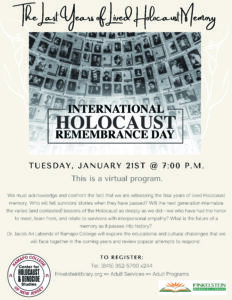
We must acknowledge and confront the fact that we are witnessing the final years of lived Holocaust memory. Who will tell survivors’ stories when they have passed? Will the next generation internalize the varied (and contested) lessons of the Holocaust as deeply as we did—we who have had the honor to meet, learn from and relate to survivors with interpersonal empathy? What is the future of a memory as it passes into history?
Dr. Jacob Ari Labendz will explore the educational and cultural challenges that we will face together in the near future and review popular attempts to respond.
Register for the Webinar in Advance
Foundational Concept Series: Antisemitism
Dr. Jonathan Judaken, Washington University in St. Louis
Thursday, February 6 at 6:30 via Zoom
Click here to register for the webinar
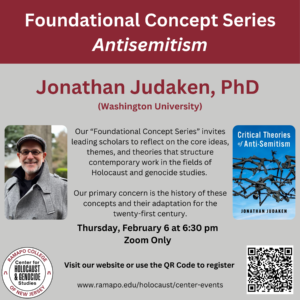
This program is part of our “Foundational Concepts” series. Throughout the 2024-2025 academic year, leading and engaging scholars will help us reflect on some of the core ideas, themes, and theories that structure contemporary work in the field of Holocaust and genocide studies. Our primary concern will be the history of these concepts and their adaptation for the twenty-first century.
Dr. Judaken is the Goldstein Professor of Jewish History and Thought; and the Chair of Jewish, Islamic, and Middle Eastern Studies at Washington University in St. Louis. You may be interested in purchasing a copy of Dr. Judaken’s latest book before the program: Critical Theories of Antisemitism (Columbia University Press, 2024).
Foundational Concept Series: Islamophobia
Asad Dandia
Tuesday, February 18 at 7:00 pm in Trustees Pavilion One
Email holgen@ramapo.edu to arrange parking
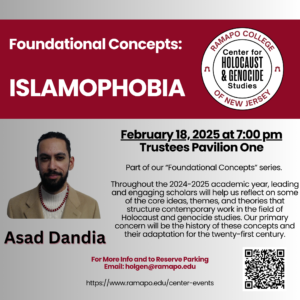
This program is part of our “Foundational Concepts” series. Throughout the 2024-2025 academic year, leading and engaging scholars will help us reflect on some of the core ideas, themes, and theories that structure contemporary work in the field of Holocaust and genocide studies. Our primary concern will be the history of these concepts and their adaptation for the twenty-first century.
Asad Dandia is a Brooklyn-born public historian, organizer, and tour guide. He was formerly the Outreach and Partnerships Manager at the Institute for Social Policy and Understanding, an organization that provides objective research and education about American Muslims to support well-informed dialogue and decision-making. Before that, Asad was the Community Program Coordinator at the New York chapter of the Council on American-Islamic Relations, where he co-published a groundbreaking report on Islamophobia in NYC. As a teenager, Mr. Dandia was a key plaintiff in an ACLU-led lawsuit that successfully challenged NYPD surveillance of the city’s Muslim communities. He holds an MA in Islamic Studies from Columbia University.
999: The Forgotten Girls
Film Screening and Discussion with Director Heather Dune
Monday, February 24 at 7:45 pm at Congregation Agudath Israel, West Caldwell
Register for this Screening
Tuesday, February 25 at 7:00 pm in Trustees Pavilion 1, Ramapo College
Email holgen@ramapo.edu to arrange parking
In commemoration of International Holocaust Remembrance Day and Women’s History Month
Special Thanks to the Bruch Family for their Support
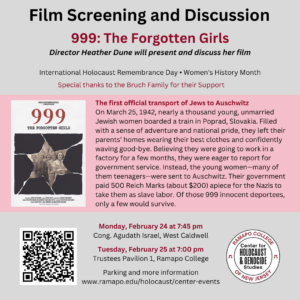
The first official transport of Jews to Auschwitz
On March 25, 1942, nearly a thousand young, unmarried Jewish women boarded a train in Poprad, Slovakia. Filled with a sense of adventure and national pride, they left their parents’ homes wearing their best clothes and confidently waving good-bye. Believing they were going to work in a factory for a few months, they were eager to report for government service. Instead, the young women—many of them teenagers—were sent to Auschwitz. Their government paid 500 Reich Marks ($200) apiece for the Nazis to take them as slave labor. Of those 999 innocent deportees, only a few would survive.
More info & parking email: holgen@ramapo.edu / 201-684-7409
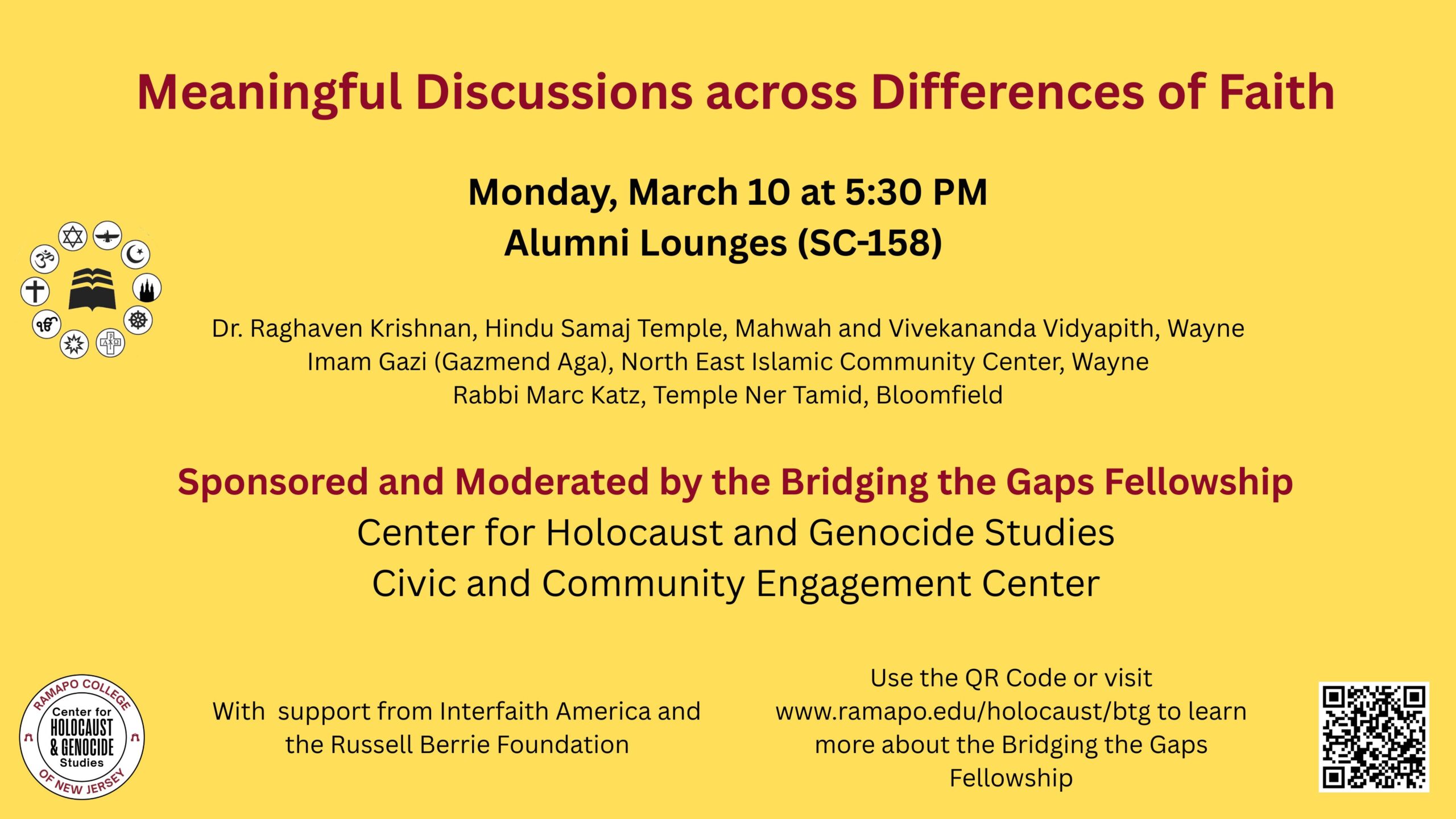
Questions, parking, and more information: holgen@ramapo.edu
Learn more about the Bridging the Gaps Fellowship
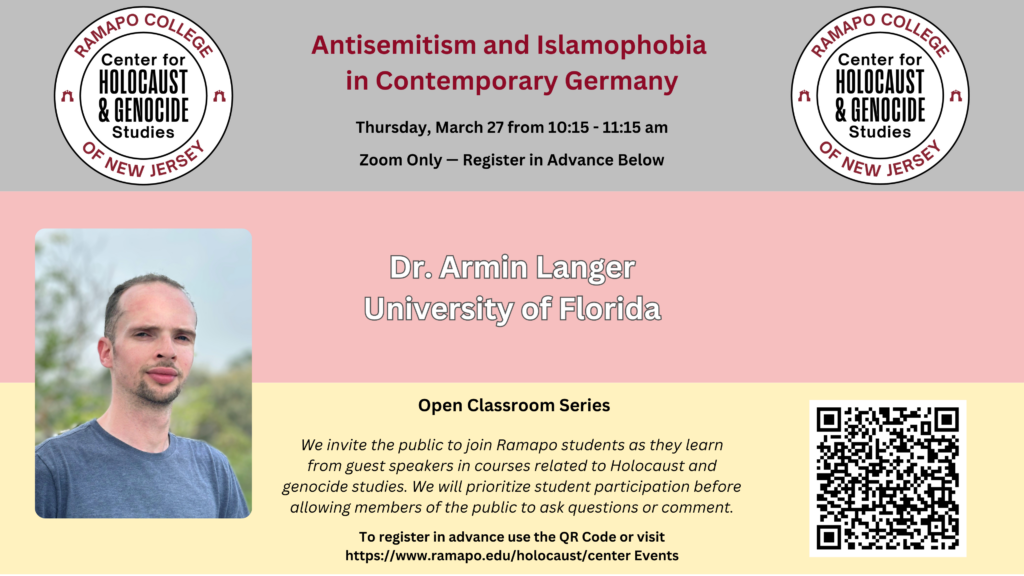
A Survivor Speaks: The 1994 Genocide of Tutsi in Rwanda
Providence Umugwaneza
Wednesday, April 2
10:00 am for schools and teachers (register here)
3:00 pm for community members (register here)
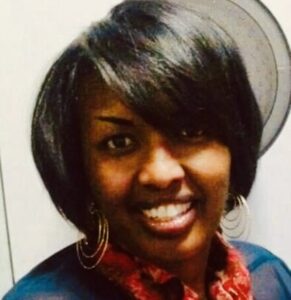
Providence Umugwaneza visited Ramapo College last year, along with her husband Erik Nkurunziza. Both survived the 1994 Genocide of Tutsis in Rwanda under very different circumstances. Ms. Umugwaneza published a moving memoir, Next Couple Hours: A Story of Fear, Loss, Courage, and Determination during and After the Genocide against Tutsis in Rwanda (2022)
These two engagements have been organized by the NJ Commission on Holocaust Education. The CHGS at Ramapo College joins other centers in our region as a proud co-sponsor.
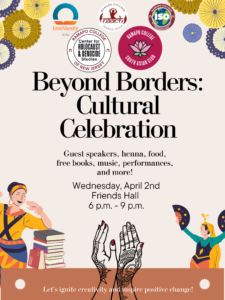
Beyond Borders
Cultural Celebration!
Wednesday, April 2nd
Friends Hall / 6-9:00 pm
We are proud to support the Ramapo College South Asian Club, which organized this important program.
Let’s ignite creativity and inspire positive change!
Leaving White Nationalism
Personal Stories and Lessons for the Future
Scott Ernest and Tyler Parker-Dipeppe
Two Panel Discussion on April 3
Ramapo Community, 1:10 pm in Friends Hall
No need to register
Regional Community, 6:30 pm at the Ridgewood Public Library
Space is limited, register here
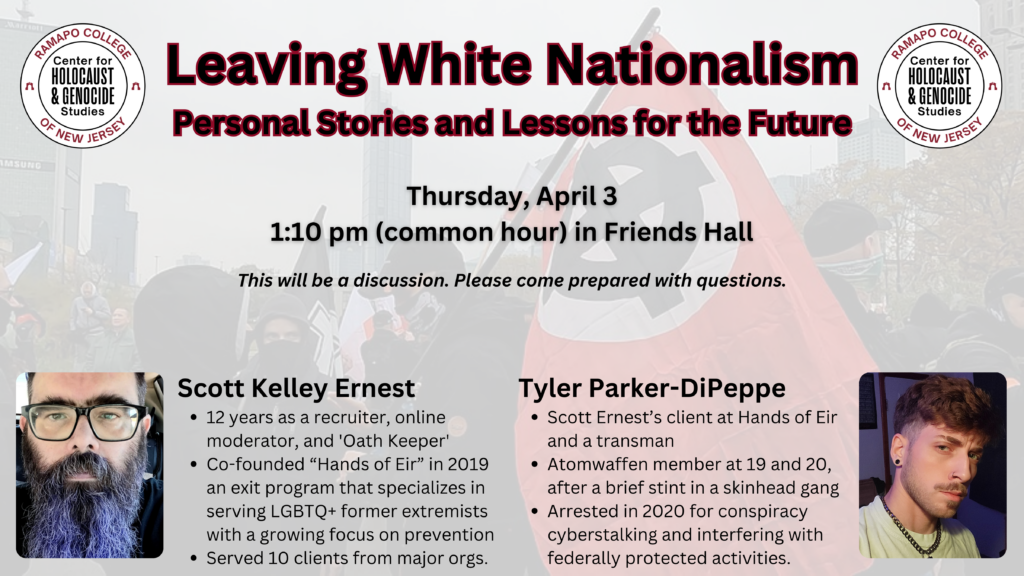
Genocide Briefing: Sudan
Danica Damplo, USHMM
Tuesday, April 8 at 6:30 pm via Zoom
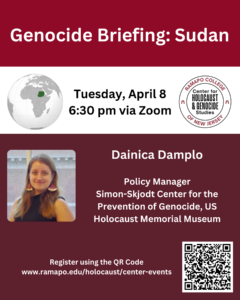
In January, 2025, the United States Government declared an ongoing genocide in Sudan. Danica Damplo will join us via Zoom to discuss the history and current state of the conflict, and will reflect on prevention measures. Ms. Damplo is a Policy Manager at the Simon-Skjodt Center for the Prevention of Genocide of the US Holocaust Memorial Museum (in Washington, DC). She is an expert on the region.
“131 Years of Armenian Genocide and Counting”
Dr. Henry Theriault
Associate Provost, Worcester State University
April 21, 2025 at 8:00 PM via Zoom (Register Here)
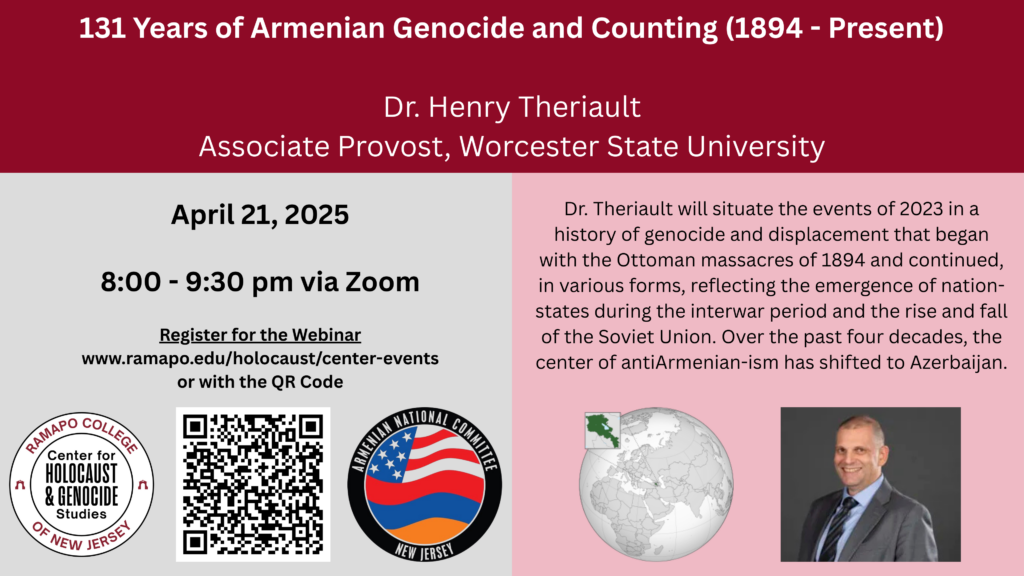
“Antisemitism: 80 Years after the Holocaust”
Jacob Ari Labendz, CHGS Director
Tuesday, May 13 at 7:00 PM
Details forthcoming
CHGS Events, Fall 2024
Jacob Ari Labendz, CHGS Director
“Jews are What Jews Eat: Community Construction, Social Belonging & Jewish Food”
September 12, 2024 at 7:00 pm at the Westwood Free Public Library
Lifelong Learning Lectures
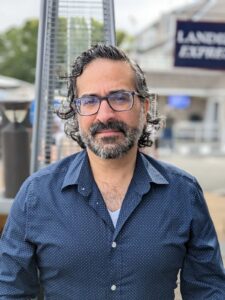 Join CHGS Director Dr. Jacob Ari Labendz for an exploration of how Jews and non-Jews have sought to mark the essence and social boundaries of Jewishness through food—from cultivation, through preparation, to consumption. Topics will include Judaism’s complex system of laws and traditions around food, attempts to police community boundaries and assert the nature of Jewish difference through food restrictions (or their inversion), inter-communal and intra-Jewish tensions as expressed through contests over food, and the rising trend of Jewish veganism. No experience necessary.
Join CHGS Director Dr. Jacob Ari Labendz for an exploration of how Jews and non-Jews have sought to mark the essence and social boundaries of Jewishness through food—from cultivation, through preparation, to consumption. Topics will include Judaism’s complex system of laws and traditions around food, attempts to police community boundaries and assert the nature of Jewish difference through food restrictions (or their inversion), inter-communal and intra-Jewish tensions as expressed through contests over food, and the rising trend of Jewish veganism. No experience necessary.
Jacob Ari Labendz and Shmuly Yanklowitz coedited a book of essays from scholars, rabbis, and activists, Jewish Veganism and Vegetarianism: Studies and New Directions (SUNY Press, 2019).
“Hunger and the Holocaust”
Dr. Helene Sinnreich, University of Tennessee Knoxville
October 9, 2024 at 6:30 via Zoom
Register for Zoom in Advance
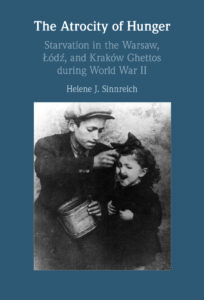 During World War II, the Germans put the Jews in Nazi-occupied Poland into ghettos which restricted their movement and, most crucially for their survival, access to food. The Germans saw the Jews as ‘useless eaters,’ and denied them sufficient food for survival. Jews had no control over Nazi food policy but they attempted to survive the deadly conditions of Nazi ghettoization through a range of coping mechanisms and survival strategies. The hunger which resulted from this intentional starvation impacted every aspect of Jewish life inside the ghettos. In this talk, we will explore their stories, drawing from diaries and first-hand accounts of the victims and survivors. (This book is open-source. Click on the photo for access.)
During World War II, the Germans put the Jews in Nazi-occupied Poland into ghettos which restricted their movement and, most crucially for their survival, access to food. The Germans saw the Jews as ‘useless eaters,’ and denied them sufficient food for survival. Jews had no control over Nazi food policy but they attempted to survive the deadly conditions of Nazi ghettoization through a range of coping mechanisms and survival strategies. The hunger which resulted from this intentional starvation impacted every aspect of Jewish life inside the ghettos. In this talk, we will explore their stories, drawing from diaries and first-hand accounts of the victims and survivors. (This book is open-source. Click on the photo for access.)
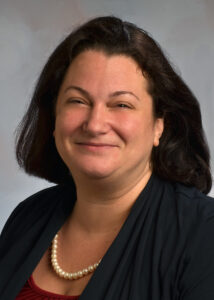 Helene Sinnreich is professor and head of the Department Religious Studies and Director of the Fern and Manfred Steinfeld Program in Judaic Studies at the University of Tennessee. Dr. Sinnreich serves as the co-editor-in-chief of the academic journal Holocaust and Genocide Studies (Oxford University Press). Dr. Sinnreich has served as a fellow at the United States Holocaust Memorial Museum in Washington D.C. (2007), Yad Vashem in Jerusalem (2009) and the Institute for Advanced Study at Central European University in Budapest (2023). Her monograph The Atrocity of Hunger: Starvation in the Warsaw, Lodz and Krakow Ghettos during World War II (Cambridge University Press, 2023) focuses on hunger and starvation in three ghettos in Poland during the Holocaust. She is also the editor of A Story of Survival: The Lodz Ghetto Diary of Heinek Fogel (Yad Vashem Press, 2015). Dr. Sinnreich is a scholar of European Jews during the Holocaust and employs a gender lens in much of her work. She has several current research projects including a study of public health in ghettos; a book on a series of selections at Auschwitz; and an examination of religious Jewish representations of Holocaust experience.
Helene Sinnreich is professor and head of the Department Religious Studies and Director of the Fern and Manfred Steinfeld Program in Judaic Studies at the University of Tennessee. Dr. Sinnreich serves as the co-editor-in-chief of the academic journal Holocaust and Genocide Studies (Oxford University Press). Dr. Sinnreich has served as a fellow at the United States Holocaust Memorial Museum in Washington D.C. (2007), Yad Vashem in Jerusalem (2009) and the Institute for Advanced Study at Central European University in Budapest (2023). Her monograph The Atrocity of Hunger: Starvation in the Warsaw, Lodz and Krakow Ghettos during World War II (Cambridge University Press, 2023) focuses on hunger and starvation in three ghettos in Poland during the Holocaust. She is also the editor of A Story of Survival: The Lodz Ghetto Diary of Heinek Fogel (Yad Vashem Press, 2015). Dr. Sinnreich is a scholar of European Jews during the Holocaust and employs a gender lens in much of her work. She has several current research projects including a study of public health in ghettos; a book on a series of selections at Auschwitz; and an examination of religious Jewish representations of Holocaust experience.
Discussing Hate in the Digital Age:
Jewish Perspectives on the Politics of Antisemitism in Contemporary Austria
Dr. Tim Corbett, Austrian Academy of Arts and Sciences
October 23, 2024 at 4:30 pm in Foundation Hall, Wagner College
Register in Advance to Join via Zoom
This program has been organized by the Wagner College Holocaust Center
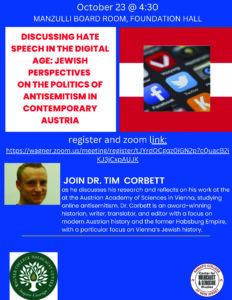 Dr. Tim Corbett, is an award-winning historian, writer, translator, and editor based in Vienna, Austria. His research and publishing activities focus on modern Austrian history and the former Habsburg Empire, with a particular focus on Vienna’s Jewish history. He is currently affiliated as a research associate with the Austrian Academy of Sciences in Vienna and serve as a permanent member of the Academic Advisory Board of the Austrian Society for the Study of Exile. He. has held numerous fellowships and visiting positions at institutions around the world including the Museum of Jewish Heritage and the Center for Jewish History in New York, Vienna University and the Vienna Wiesenthal Institute for Holocaust Studies.
Dr. Tim Corbett, is an award-winning historian, writer, translator, and editor based in Vienna, Austria. His research and publishing activities focus on modern Austrian history and the former Habsburg Empire, with a particular focus on Vienna’s Jewish history. He is currently affiliated as a research associate with the Austrian Academy of Sciences in Vienna and serve as a permanent member of the Academic Advisory Board of the Austrian Society for the Study of Exile. He. has held numerous fellowships and visiting positions at institutions around the world including the Museum of Jewish Heritage and the Center for Jewish History in New York, Vienna University and the Vienna Wiesenthal Institute for Holocaust Studies.
Foundational Concepts: Genocide
Dr. A. Dirk Moses, CUNY
October 29, 2024 at 6:30 PM in Trustees Pavilion-1
Please email holgen@ramapo.edu to reserve parking.
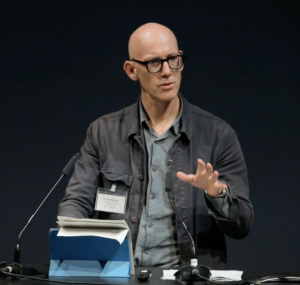 One of today’s foremost scholars of genocide, Dr. A. Dirk Moses (CUNY) will introduce the concept of “genocide” and lead attendees in a discussion of the questions, challenges, and trends which are leading scholars to rethink and reframe the concept for the twenty-first century.
One of today’s foremost scholars of genocide, Dr. A. Dirk Moses (CUNY) will introduce the concept of “genocide” and lead attendees in a discussion of the questions, challenges, and trends which are leading scholars to rethink and reframe the concept for the twenty-first century.
This program is part of our “Foundational Concepts” series. Throughout the 2024-2025 academic year, leading and engaging scholars will help us reflect on some of the core ideas, themes, and theories that structure contemporary work in the field of Holocaust and genocide studies. Our primary concern will be the history of these concepts and their adaptation for the twenty-first century.
A. Dirk Moses is the Spitzer Professor of International Relations at the City College of New York, CUNY. Raised in Brisbane, Australia, he was educated at the there, Scotland, and in the US. Before coming to City College, he taught at UNC Chapel Hill and the University of Sydney. He is the author and editor of books on genocide, memory and intellectual history. He edits the Journal of Genocide Research. More at www.dirkoses.com.
Interested readers may with to purchase Dr. Moses’ 2021 book, The Problems of Genocide.
NJ-Area Memorial Scroll Gathering 2024
November 3, 2024
Temple Beth Tikvah — Wayne, NJ
We are honored to host a unique gathering of Czech Memorial Scrolls—Torahs saved from the fires of Nazism—on the sixtieth anniversary of their arrival at London’s Westminster Synagogue. The Memorial Scrolls Trust selected congregations and organizations around the world to serve as custodians for one of these sacred scrolls, with a charge to return them to active Jewish life. Join with us, as we celebrate these living memorials to Jewish heritage and to our siblings murdered in the Shoah. Through these scrolls we entwine our lives with theirs and recommit to our traditions and our mission of “never again.”
Click Here to Reserve Your Place and for More Information
Tickets are free of charge. We suggest a donation of $10/individual and $18/family
This gathering is open to the public with advanced registration. It features congregations and organizations in NJ and southern NY that care for a Czech Holocaust Torah Scroll (or multiples) from the Memorial Scrolls Trust.
Synagogues and organizations with Czech Memorial Scrolls that have not yet confirmed their participation should email gathering@scrollgatheringnj.org or submit this online form.
Synagogues and organizations interested in learning more about their scroll’s community of origin and developing educational programming around it should contact the Center for Holocaust and Genocide Studies at Ramapo College: holgen@ramapo.edu / 201-684-7409
Co-organizers: Temple Beth Tikvah (TBT), Wayne; the Rabbi Israel S. Dresner Center for Collaborative Programs and Learning at TBT, and the Memorial Scrolls Trust.
Please email gathering@scrollgatheringnj.org with any questions that you may have.
Our Kolín Scroll
The CHGS welcomed a Czech Memorial Scroll to Ramapo at a moving ceremony on May 1, 2023.
Before WWII, the Torah belonged to the Jewish community of Kolín, a city 40- miles east of Prague. Experts estimate it was written in the mid-18th century.
We thank Cipora Schwartz and Dr. Susan Gaulden for their generosity, which made this possible.
Why We Need an LGBT History of the Holocaust:
The Romeo and Juliet of Wartime Prague
Dr. Anna Hájková, University of Warwick (UK) and University of Michigan
November 7, 2024 at 6:30 pm in in Trustees Pavilion-1
Please email holgen@ramapo.edu to reserve parking.
Between 1924 and 1942, for 18 years, Ludwig, a Jewish clerk from a Brno textile dynasty, and Paul, Sudetengerman, a lab assistant, lived together in the Vinohrady district of Prague, Czechoslovakia. Theirs was a happy relationship of mutual support and harmony, free of material worries. But in the early morning of March 1942, it all ended when the Prague police arrested the couple for Paragraph 175, which criminalized homosexuality. Three months later, both men were serving long prison sentences. Ludwig, as a Jew, was eventually deported to Auschwitz and murdered. Paul was set free six months after liberation in May 1945, because homosexual sex remained illegal in Czechoslovakia. We will not find this story in the annals of the Holocaust of Czech Jewry, nor in the histories of wartime and occupied Czechoslovakia. Queer Holocaust history has been systematically erased. In her talk, Anna Hájková shows us how the silences around same sex desire in the Shoah came to be, and how they can help us understand history better and more inclusively.
Dr. Anna Hájková (pronunciation guide) is Reader in modern European continental history at the University of Warwick, UK. This term, she is fellow at the Frankel Center for Judaic Studies at the University of Michigan. She is the author of The Last Ghetto: An Everyday History of Theresienstadt (OUP, 2020). Hájková is the pioneer of queer Holocaust history.
Interested readers may want to purchaseThe Last Ghetto: An Everyday History of Theresienstadt (Oxford, 2020).
Mischlinge Exposé
A Multimedia Performance by Carolyn Enger
In Commemoration of Kristallnacht
November 11, 2024 at 7:00 pm
Beth Haverim Shir Shalom
280 Ramapo Valley Road, Mahwah
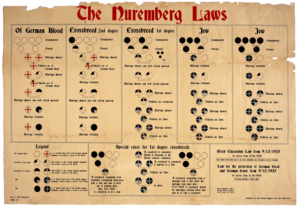 The Mischlinge Exposé weaves a multimedia tapestry around a little-known aspect of the Holocaust: the Mischlinge (a derogatory Nazi term for those neither fully Jewish nor fully Aryan). Interweaving video and audio testimony from Carolyn’s godmother and her father (both labeled Mischling, Grade A by the Nazis), with the music of composers from the salon period who converted to Christianity in the decades before the war, and works reacting to questions of identity after the war, the program vividly illustrates what it was like to be between worlds in Germany in the first half of the 20th century. Through the telling of her family story, Ms. Enger’s live documentary The Mischlinge Exposé directly addresses universally significant issues of identity and inclusion, encouraging empathy, tolerance, and engagement.
The Mischlinge Exposé weaves a multimedia tapestry around a little-known aspect of the Holocaust: the Mischlinge (a derogatory Nazi term for those neither fully Jewish nor fully Aryan). Interweaving video and audio testimony from Carolyn’s godmother and her father (both labeled Mischling, Grade A by the Nazis), with the music of composers from the salon period who converted to Christianity in the decades before the war, and works reacting to questions of identity after the war, the program vividly illustrates what it was like to be between worlds in Germany in the first half of the 20th century. Through the telling of her family story, Ms. Enger’s live documentary The Mischlinge Exposé directly addresses universally significant issues of identity and inclusion, encouraging empathy, tolerance, and engagement.
Internationally celebrated American pianist Carolyn Enger has gained critical acclaim for her exquisite lyrical playing and her deeply felt interpretations. In addition to an active performance schedule on two continents, Ms. Enger has enjoyed remarkable success as a recording artist: The New York Times selected her Naxos recording of intimate Ned Rorem miniatures, Piano Album I & Six Friends, as one of the newspaper’s “Best In Classical Recordings”, writing “Among the 90th birthday tributes this year to the essential American composer Ned Rorem, this recording especially stands out,” while Gramophone declared, “Enger raises the miniatures to a higher level.” Recently the recording was “Album of the Week” on Sirius XM’s Symphony Hall and was featured on their program Living American. Her latest recording Resonating Earth is set to be released in September 2024. (Complete biography.)
Native American Heritage Month Banquet
November 22, 2024 in the York Room
The CHGS was a proud supporting co-sponsor of this year’s Native American Heritage Month Banquet, which featured Chief Dwaine Perry of the Ramapough Munsee Lunaape Nation (a new member of our advisory board) and Chief Carla Alexander of the Ramapough Munsee Lunaape Nation’s Deer Clan.
Organized and sponsored by Ramapo College Anthropology, Prof. James Pascal and Prof. Neriko Doerr.
More information and photos here.
Foundational Concepts: Refugees and Human Rights
Dr. Carly Goodman, Rutgers University
November 25, 2024 at 6:30 pm in Friends Hall
Please email holgen@ramapo.edu to reserve parking.
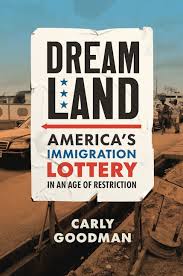 After World War II, nations around the world developed a framework to define what it meant to be a “refugee” and provide for refugee rights and protections. In this talk, Goodman will discuss how the U.S. resettled refugee groups during the Cold War, at times in alignment with the international framework, and at others, straying from it to serve U.S. political aims. With the passage of the Refugee Act of 1980, the U.S. committed to ongoing resettlement of refugees and to other human rights principles. In practice however, the U.S. treatment and reception of refugees and asylum seekers have been shaped by political factors and considerations beyond, and sometimes at odds with, obligations under U.S. and international law.
After World War II, nations around the world developed a framework to define what it meant to be a “refugee” and provide for refugee rights and protections. In this talk, Goodman will discuss how the U.S. resettled refugee groups during the Cold War, at times in alignment with the international framework, and at others, straying from it to serve U.S. political aims. With the passage of the Refugee Act of 1980, the U.S. committed to ongoing resettlement of refugees and to other human rights principles. In practice however, the U.S. treatment and reception of refugees and asylum seekers have been shaped by political factors and considerations beyond, and sometimes at odds with, obligations under U.S. and international law.
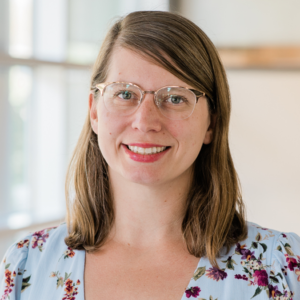 This program is part of our “Foundational Concepts” series. Throughout the 2024-2025 academic year, leading and engaging scholars will help us reflect on some of the core ideas, themes, and theories that structure contemporary work in the field of Holocaust and genocide studies. Our primary concern will be the history of these concepts and their adaption for the twenty-first century.
This program is part of our “Foundational Concepts” series. Throughout the 2024-2025 academic year, leading and engaging scholars will help us reflect on some of the core ideas, themes, and theories that structure contemporary work in the field of Holocaust and genocide studies. Our primary concern will be the history of these concepts and their adaption for the twenty-first century.
Carly Goodman is an assistant professor in the Department of History at Rutgers University-Camden. Her book Dreamland: America’s Immigration Lottery in an Age of Restriction (UNC Press, 2023) received the First Book Award from the Immigration and Ethnic History Society. She serves as senior editor of Made by History at TIME Magazine, (formerly at the Washington Post).
Previous Programs
Copyright ©2025 Ramapo College Of New Jersey. Statements And Policies. Contact Webmaster.
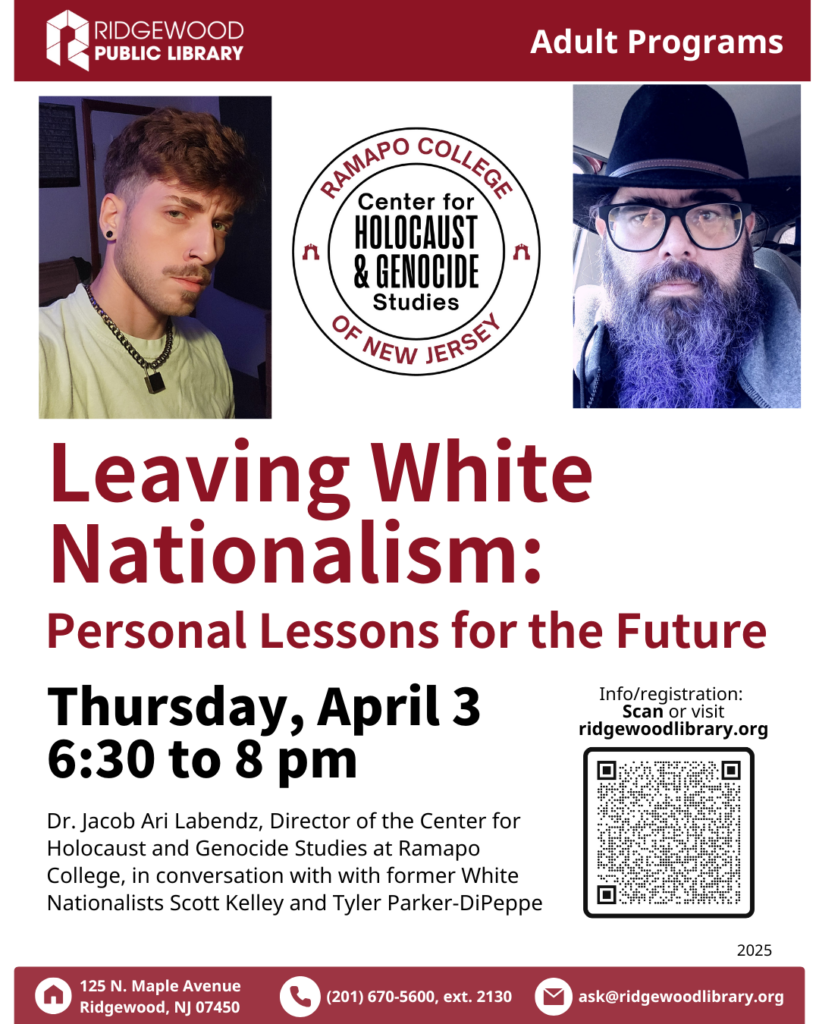
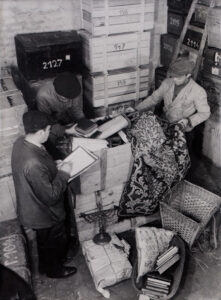
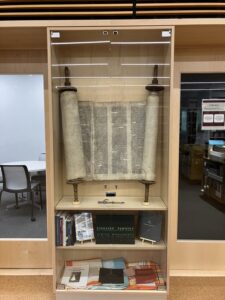
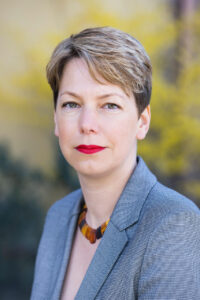
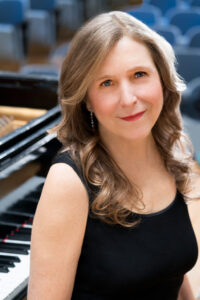

Follow Us!